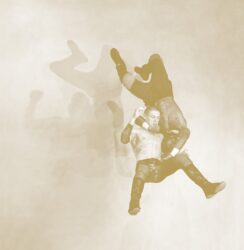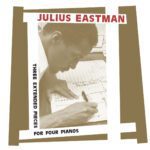ROBERT TAKAHASHI CROUCH – JUBILEE 
In his letter to Lawrence English (included in full on the Bandcamp page), Robert Takahashi Crouch notes that “abstract sound is not terribly effective at communicating complex ideas; it can only present the formal qualities of itself, as it is heard; it can’t tell you much beyond that with certainty. The timbral, rhythmic, harmonic, and melodic information—yes that’s there. But without context, what else can we know?”
It’s true: Jubilee can be listened and enjoyed without any knowledge of the context it was created in. But there will be questions. About the titles, to begin with: A Ritual, I’ve Been Part Of Evil Doing, and Reconciliation.
Merging “longform low-frequency drone work against a reductive sense of harmony”, Crouch aims to create a listening space “in which the listener becomes paramount, their narrative and reflections in the moment as critical and valuable as those of the album’s creator.”
At the same time, and perhaps somewhat contradictory with this, he describes the context of this music as a deeply personal reflection on some of the significant events in his life, being a bi-racial homosexual person.
“In my life I’ve felt the sting of emotional abuse, racism, classism, and homophobia. I’ve have had people throw bottles at me and my boyfriend from moving cars, and I’ve been beaten and left unconscious in a parking lot at 2am. And I’ve also done some really fucked up shit too. They’re things I don’t want to mention or to speak about—but I’ve done them.”
Crouch describes the compositional process as an “opportunity to collect and organize sounds, texts, ideas, and images that could create not just a context for listening, but a space for a listener to inhabit. A shared listening experience.
“At its core, the album is about creating a space for selfforgiveness.”
JULIUS EASTMAN – THREE EXTENDED PIECES FOR FOUR PIANOS 
Imagine me, or any other middle-class suburban white guy releasing music with titles like Evil Nigger, Gay Guerilla, and Crazy Nigger. It wouldn’t take very long before we would get ‘canceled’, I guess.
But we’re talking the 1970s and 1980s here, long before the woke movement even existed, and Julius Eastman being one of the very few African-Americans to gain recognition in the New York Avant-Garde scene.
But even so, things did not end well for Eastman, “whose melancholy influenced his genius as well as his tragic destiny: suffering from various addictions, declared missing, actually homeless. During Winter of 1981-82, he got deported from his apartment by the police, who destroyed most of what he owned – including scores and recordings. He was found dead in 1990, on the streets of Buffalo, after years of vagrancy.”
That background story makes these three pieces for four pianos (pieces that “are among the most powerful in contemporary music”) even more painfully poignant.
The performers – Nicolas Horvath, Melaine Dalibert, Stephane Ginsburgh and Wilhelm Latchoumia hardly leave room to breathe in the almost physical opening track Evil Nigger. Gay Guerilla is less violent but somehow seems to exude the same emotional desperation. The relentless hammering returns in Crazy Nigger on the second CD.
All of these pieces are very long: 21, 30 and 56 minutes respectively. The length combined with the intensity of the music may be uneasy and hard to listen to, but it is fascinating in a strange way. After all, as Julius Eastman‘s lifetime teaches us, life can be uneasy and hard.





